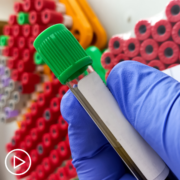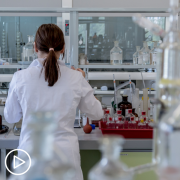Catalyzing Lung Cancer Care | The Transformative Impact of Early Biomarker Testing
Catalyzing Lung Cancer Care: The Transformative Impact of Early Biomarker Testing from Patient Empowerment Network on Vimeo.
For non-small cell lung cancer (NSCLC) patients who receive early biomarker testing, what are the impacts? Expert Dr. Samuel Cykert from UNC School of Medicine discusses the benefits of biomarker testing and proactive advice for patients.
[ACT]IVATION TIP
“…make sure you discuss with the doctor who’s doing the biopsy that I really want biomarker testing at the beginning of treatment.”
Download Resource Guide | Descargar guía de recursos
See More from [ACT]IVATED Non-Small Cell Lung Cancer
Related Resources:
Transcript:
Lisa Hatfield:
Dr. Cykert, what are the main benefits of early and comprehensive biomarker testing in non-small cell lung cancer patients, and how does it impact treatment, decision-making, prognosis, and overall patient outcomes?
Dr. Samuel Cykert:
And 80 percent of patients with lung cancer are diagnosed with advanced disease, and really over the last half-dozen years, biomarker testing has become so important because in advanced disease, biological treatments have actually shown good benefits for a lot of patients and for some patients, just explosive benefits. And so on the treatment side, it’s very important to get a battery of biomarker tests, just to understand, as a patient, if you’re eligible for one of these treatments that are really good in terms of improving length and quality of life.
The second reason they’re important is a lot of work is being done on the research side of biomarker testing and biomarker treatments, so if a patient is to qualify for a really strong research study, biomarker testing is just something that’s very, very important. And so on the current treatment side and on the research side, there are really, really tremendous reasons to go ahead and get tested, and so my tip is since not every patient gets tested, make sure you discuss with the doctor who’s doing the biopsy that I really want biomarker testing at the beginning of treatment.
Share Your Feedback
Create your own user feedback survey













